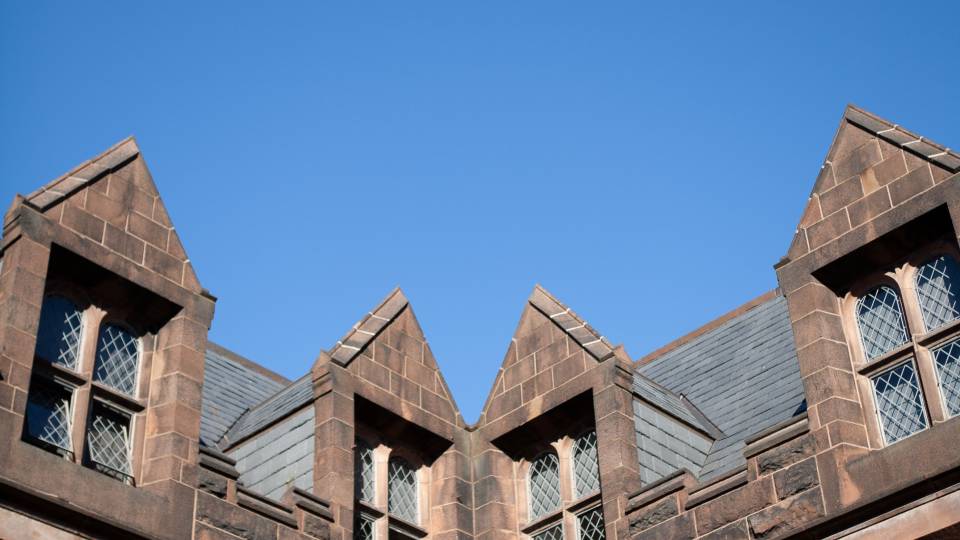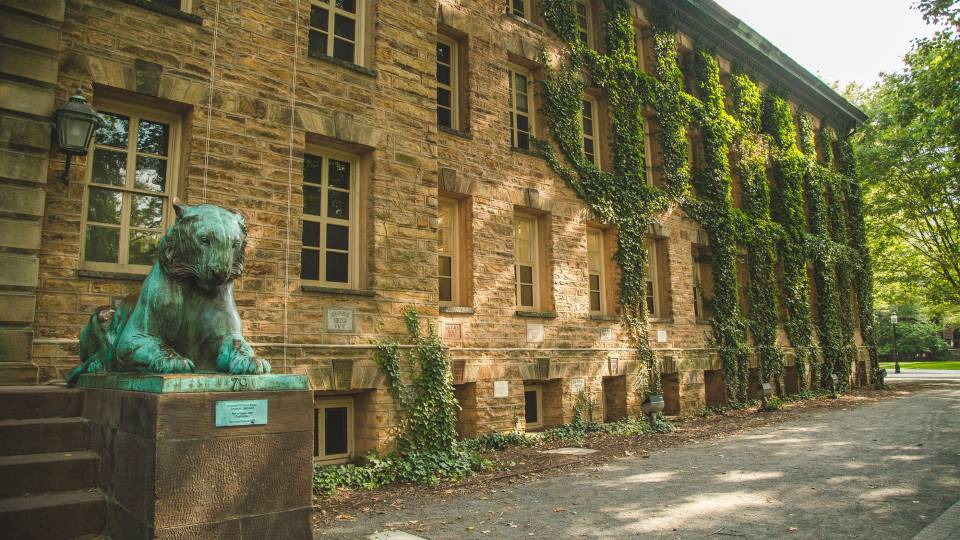Princeton University has named seven members to its Board of Trustees, effective July 1.
The trustees are:
- José Alvarez and Beth Cobert, who were elected by the board to serve as charter trustees;
- Yan Huo and Carol Quillen, who were elected by the board to serve as term trustees;
- Yolandra Gomez Toya and Jackie Yi-Ru Ying, who were elected by alumni to serve as alumni trustees; and
- Naomi Hess, who was elected by the junior and senior undergraduate classes and the two youngest alumni classes to serve four years as a young alumni trustee.
Completing their terms as trustees on June 30 are Kirsten Bibbins-Domingo, Class of 1987; Josh Bolten, Class of 1976; C. Kim Goodwin, Class of 1981; Paul Haaga Jr., Class of 1970; Myesha Jemison, Class of 2018; Kimberly Johnson, Class of 1995; Craig Robinson, Class of 1983; and Marco Tablada, Class of 1993.
Biographical information about the new trustees follows.

José Alvarez, Beth Cobert, Yan Huo and Carol Quillen
José Alvarez, of East Corinth, Vermont, is a clinical professor of business administration at the Tuck School of Business at Dartmouth as of July 1. He is also a visiting senior lecturer at Harvard Business School, where he has served on the faculty since 2009. He conducts research and teaches courses in food systems, board governance and retailing.
Prior to his academic career, Alvarez spent nearly 20 years in the supermarket industry, culminating in his tenure as president and chief executive officer of Stop & Shop/Giant-Landover. Alvarez currently serves on the board of directors for United Rentals, where he is the chair of the Nominating and Governance Committee; the TJX Companies; and Munoz Group. He is also the chair of the board of the Joyce Foundation, lead director of Empower Schools, a director of the Good Jobs Institute and a director of Daily Table.
He holds an MBA from the University of Chicago and a bachelor’s degree in history from Princeton, where he served as an alumni trustee from 2016-20.
Beth Cobert, of Denver, is chief operating officer at the Markle Foundation, where she helps lead Markle’s Rework America Alliance, a unique partnership of civil rights organizations, nonprofits, private sector employers, labor unions, educators and others working to open opportunities for millions of workers to move into better-paying jobs with career growth potential.
Prior to joining the Markle Foundation, Cobert served as acting director of the Office of Personnel Management under President Obama and as the Deputy Director for Management and the U.S. Chief Performance Officer at the Office of Management and Budget. She began her career at McKinsey & Company, where she became a senior partner.
Cobert is a member of the board of directors of CBRE Group, Inc. and the National Academy of Public Administration. She received an MBA from Stanford University and a bachelor’s degree in economics from Princeton, where she served as an alumni trustee from 2017-21.
Yan Huo, of London, is managing partner and chief investment officer of Capula Investment Management LLP. Prior to co-founding Capula in 2005, he spent most of his professional career at J.P. Morgan, where he worked in its derivatives research and proprietary-positioning business.
Huo is a trustee of Fudan University and the Huo Family Foundation. He is also a member of the U.S. Treasury’s Borrowing Advisory Committee. He received a Ph.D. in electrical engineering from Princeton in 1994 and a bachelor of science from Fudan University.
Carol Quillen, of Davidson, North Carolina, is the president of Davidson College. She will step down from that role at the end of July after 11 years of service, where she has consistently advocated for equal educational opportunity, an inclusive campus community and the value of a reimagined, holistic liberal arts education. Prior to her current role, Quillen served as a professor and administrator at Rice University for over 20 years.
In 2014, President Obama appointed her to the Advisory Council on Financial Capability for Young Americans, and she currently serves as a trustee of the National Humanities Center. Her service includes past terms on the boards of the Kinkaid School, the American Council on Education, the Bechtler Museum of Modern Art, Credential Engine, and the Levine Museum of the New South.
Quillen graduated from Princeton with a Ph.D. in history. She holds a bachelor’s degree in history from the University of Chicago.

Yolandra Gomez Toya, Jackie Yi-Ru Ying and Naomi Hess
Yolandra Gomez Toya, of Bernalillo, New Mexico, is a pediatrician at a private practice in Rio Rancho, New Mexico, where she provides care to a diverse group of patients from many different backgrounds. She also serves as an assistant professor at the University of New Mexico (UNM) School of Medicine.
Prior to becoming a practicing physician, Toya worked on a suicide prevention program among Native youth on her Jicarilla Apache reservation, and worked for eight years with various state agencies, tribes and universities, focusing on such chronic disease issues as obesity and Type 2 diabetes that are prevalent in the Native community. She maintains close contact with Native American communities, serving as an advisor in public health and clinical medicine, and continues to do community-based research with tribes with their participation and approval.
Toya earned a master of public health degree in health policy and administration from the University of California-Berkeley and an M.D. from the UNM School of Medicine. At Princeton, she concentrated in the School of Public and International Affairs (SPIA). She founded and co-led the Native Alumni of Princeton affinity group, sits on the Princeton Art Museum’s advisory group for Indigenous North America and advised on the creation of the new endowed professor of Indigenous studies.
Jackie Yi-Ru Ying, of Singapore, earned a Ph.D. in chemical engineering from Princeton in 1991 as an AT&T Bell Laboratories Ph.D. Scholar. She received a bachelor’s degree in engineering from Cooper Union in 1987, where she graduated summa cum laude.
Ying is the founder and director of the NanoBio Lab, an incubator that translates and commercializes research in nanomedicine and diagnostic assays. She also established the Institute of Bioengineering and Nanotechnology in Singapore in 2003. Ying began her career at the Massachusetts Institute of Technology, where she became the youngest full professor in the history of the Department of Chemical Engineering. Her inventions have led to more than 190 primary patents, 42 of which have been licensed to multinational and startup companies.
Ying has received numerous awards for her research in bio-nanotechnology. She was elected to the German National Academy of Sciences Leopoldina, is a fellow of the U.S. National Academy of Inventors and the American Association for the Advancement of Science, and was recently inducted into the U.S. National Academy of Engineering. Ying also serves as an interviewer for Princeton in southeast Asia and is a member of the Princeton Alumni Association of Singapore’s executive committee.
Naomi Hess, of Clarksville, Maryland, is a member of the Class of 2022. She concentrated in SPIA, and earned certificates in the Humanities Council’s Program in Journalism and in gender and sexuality studies.
At Princeton, Hess co-founded the Undergraduate Student Government Disability Task Force, which led accessibility training for eating clubs and campus committees. She served as a fellow with the Office of Disability Services’ AccessAbility Center and established the Jewish Disability Awareness and Inclusion Month Shabbat for the Center for Jewish Life. She was an associate news editor at The Daily Princetonian and is a member of Butler College.
Hess was awarded the Walter E. Hope Class of 1901 Medal at Princeton’s 2022 Class Day, which recognizes the senior who, in the judgment of the student’s classmates, has done the most for Princeton. She was also given the Spirit of Princeton Award from the Office of the Dean of Undergraduate Students.
The Board of Trustees(Link is external) has fiduciary responsibility to ensure that the University carries out in perpetuity its educational and research mission.
The powers and allocations of responsibilities of the Board derive from, and are set forth in, Princeton’s original Charter of 1746 and its amendments, from legislation, from the Board’s own bylaws(Link downloads document) and from resolutions it passes from time to time. The 40-person board carries out its responsibilities and discharges its duties in part through standing committees, including those on academic affairs, diversity and inclusion, finance, grounds and buildings, and student life, health and athletics.




